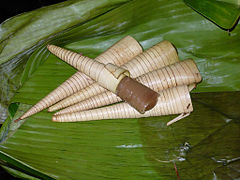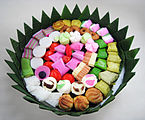Clorot
 Cerorot, sweets made of coconut milk and rice flour wrapped in coconut leaves; sold in Bali. | |
| Alternative names | Celorot, cerorot, jelurut |
|---|---|
| Type | Snack (Kue/Kuih) |
| Place of origin | Indonesia |
| Region or state | Purworejo, Java[1][2][3] |
| Associated cuisine | Brunei,[4][5][6] Indonesia and Malaysia |
| Main ingredients | Rice flour, coconut milk, wrapped with young coconut leaf |
Clorot, celorot, cerorot, or jelurut is an Indonesian traditional sweet snack (kue or kuih) made of sweet and soft rice flour cake with coconut milk, wrapped with janur or young coconut leaf in cone shape.[7] It is a popular traditional sweet snack commonly found in Brunei,[4][5][6] Indonesia, and Malaysia.[8]
In Java, it is known as clorot or celorot, and commonly associated with Javanese traditional jajan pasar (market munchies).[7][9] In Bali and Lombok islands of Indonesia, it is known as cerorot. In Brunei and in the Malaysian states of Sabah, it is known as celurut or jelurut.[10]
Ingredients and cooking method
[edit]Gula jawa (palm sugar), pandan leaf, salt and water are boiled until done and mixed with coconut milk. This sweet liquid then being poured upon rice flour and sago or tapioca flour, and mixed evenly. The janur or young coconut leaf rolled to form a long cone, similar to a small trumpet, secured and arranged upright. The thick-liquid sweet dough then filled into this coconut leaf cones until three-quarter full. Then the top section is filled with the mixture of coconut milk, rice flour and salt. These filled cones then being steamed for about 15 minutes until the dough inside the cone are cooked and hardened.[9]
See also
[edit]References
[edit]- ^ "Pelatihan Pengolahan Pangan Khas Purworejo "CLOROT"" (PDF), sikkn.umpwr.ac.id
- ^ "Yuk, Cicipi Makanan Khas Purworejo yang unik ini", Detik
- ^ "5 Jajanan Tradisional Jawa yang Terancam Punah Jika Tidak Dilestarikan", liputan6, 19 February 2022
- ^ a b Amelia Azizi (7 October 2020). "10 Makanan Khas Brunei Darussalam yang Lezat & Wajib Anda Coba". www.libur.co (in Indonesian). Archived from the original on 20 October 2021. Retrieved 20 November 2021.
- ^ a b Rosera Mohd (21 March 2016). "Malay 'kuih' a waning tradition". The BT Archive. Retrieved 20 November 2021.[permanent dead link]
- ^ a b Normalita Vinska (6 May 2021). "7 Makanan Khas Brunei Darussalam ini Cocok untuk Pengganjal Perut Ketika Berbuka Puasa Nih Guys!". Pararta.com (in Indonesian). Archived from the original on 19 November 2021. Retrieved 20 November 2021.
- ^ a b "Dari Celorot Sampai Engkak Ketan" (in Indonesian). Femina. Retrieved 19 June 2015.
- ^ Abd. Latip Talib (2006). Beraraklah awan pilu (in Malay). Utusan Publications. pp. 127–. ISBN 978-967-61-1899-8. Retrieved 17 August 2013.
- ^ a b "Clorot (Jawa)" (in Indonesian). Sajian Sedap. 15 December 2010. Archived from the original on November 28, 2012. Retrieved 19 June 2015.
- ^ "Kebudayaan (Brunei)" (in Malay). Papar District Office. Archived from the original on 26 October 2004. Retrieved 17 August 2013.

